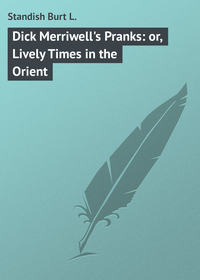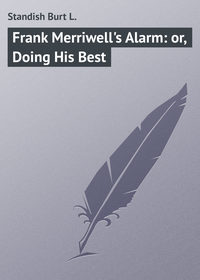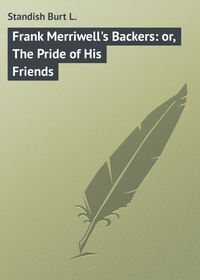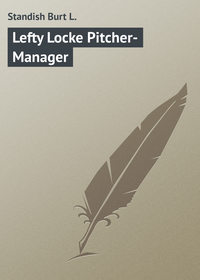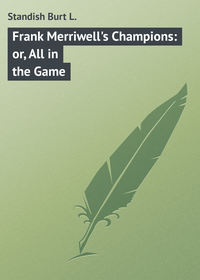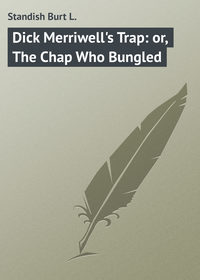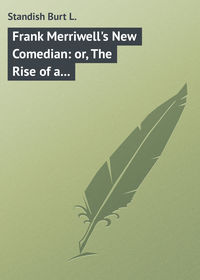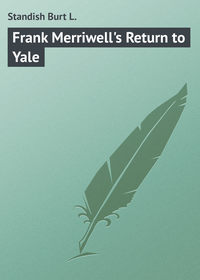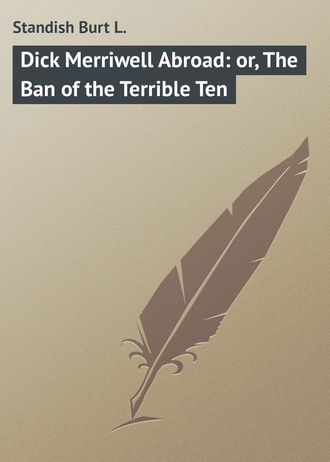 полная версия
полная версияDick Merriwell Abroad: or, The Ban of the Terrible Ten
Budthorne refused to believe his sister’s assertion that his comrades were cheating and robbing him; but at last, through the cleverness of Dick Merriwell, they were exposed, and he swore he would never again have anything to do with them.
Fearing his will power would not be strong enough to hold out, Nadia had induced him to leave London and come north into Scotland, thinking the rascals might be tricked and baffled.
But Bunol had succeeded in tracing them, while Marsh and Durbin remained behind and watched Merriwell’s party, correctly fancying that Dick and his friends intended to join the Budthornes later.
Dick, Brad, and Professor Gunn were followed to Edinburgh by the two. In Edinburgh, by the merest accident, the scoundrels learned that the Budthornes had gone to Kinross.
Without the knowledge of Dick and his friends, the very train that bore them north to Kinross carried Marsh and Durbin in another compartment.
Thus the opposing forces were gathering at a point on Lochleven, where it seemed that another clash between them might occur.
Bunol had wired his pals in London, but not until after they had left for the north. He had received no answer from them.
Having left the Ben Clench and walked as far as the woods, the Spanish youth turned and looked back. His keen eyes surveyed the house, and even at that distance he fancied he saw one of the curtains move at an upper window.
“If they are looking,” he muttered, “I am now too faraway for them to recognize me.”
At the back of the inn he saw a small man appear and wave something white.
“It is well,” muttered the rascal.
Then he turned and disappeared into the woods.
The trees broke the biting wind, but Bunol cursed the cold and the country.
Coming to a little footpath where the thin snow showed the imprints of many feet, he turned off and walked a short distance to the shore of the lake, on which lay a stout boat.
Sitting on a fallen tree near the boat was a sandy-haired, bearded, rough-looking man, who had a rather brutal face, and, judging by his massive frame, possessed great strength.
“Well, MacLane, I am returned,” said Miguel.
The man nodded.
“I see ye are,” he said. “Did ye ha’ guid luck?”
“Oh, yes; you were right in saying my birds were at the Ben Cleuch. Now, if Aaron keeps his part of the contract – ”
“Fear nawt, he wi’ keep it,” nodded MacLane. “Aaron kens Rob MacLane fu’ well, an’ he dare na disobey me. He will come.”
“I think he will,” agreed Bunol. “I looked back, and a small man waved something at me from the back of the house.”
“That were Aaron. I told him to follow ye, man, when he left, but to take guid care he were no’ observed. He will be here.”
“Well, I hope he comes soon, for this devil’s weather is uncomfortable.”
“Hoot man! Ye dinna ken what cauld weather is.”
“If that’s the case, I don’t want to know,” retorted Bunol. “This is quite enough for me.”
They sat on the log, talking in low tones, until a little, bent man, with a shawl wrapped about his shoulders, came gliding softly through the woods and stood before them.
“Here’s Aaron,” said MacLane. “Aaron, this is the man I would ha’ ye meet.”
Aaron said nothing, but surveyed Bunol with a pair of small eyes that were set close together and were filled with a light of mingled cunning and simplicity. It was not the face of a man to trust, yet for five years Aaron had been with the Widow Myles, and had seemed faithful as a grateful dog.
“Tell Aaron what ye want, man,” said MacLane. “He will do it.”
“Aaron, at the inn there are two guests – a brother and a sister.”
The little man in the shawl bobbed his little head.
“I will not attempt to explain my reasons to you, Aaron,” the Spanish youth went on; “but this night MacLane and I will get our hands on the man, and you must help us. You will be paid well.”
“I ha’ told him that,” interrupted the huge man. “I gied him the siller ye ga’ me. Did I no gie ye th’ siller, Aaron?”
“Yes,” said Aaron, “I ha’ the siller.”
“You shall have twice as much more if you follow directions faithfully,” promised Bunol, and the eyes of the little man glowed greedily. “If you are half as shrewd as MacLane says, you’ll get into no trouble over it. You wait on the guests at table?”
Aaron nodded.
“What does Budthorne drink at supper?”
“A cup o’ tay.”
“Well, see this package,” said the Spaniard, holding: up a tiny package. “It contains a powder. To-night you must contrive to get it into Budthorne’s cup of tea.”
“It is poison!” said Aaron fearfully.
“Nothing of the sort. Budthorne has been a drinking man, but he is trying to stop. The effect of this powder will be to make him crazy for liquor. Twenty minutes after he takes the powder he’ll be ready to barter his soul for one drink. Then, Aaron – listen closely – you must contrive to meet him and tell him somehow that you can get him a drink. Tell him to step outside the house and come round to the back, promising to meet him with liquor, but state that the stuff is some you have stolen from the widow. Do you understand?”
“I do,” said Aaron. “But what will happen when he comes out?”
“MacLane and I will be hidden there. We’ll fall on Budthorne and carry him off. MacLane is strong as a giant, and we’ll have little trouble.”
“Na! na!” exclaimed Aaron. “It is I that will hae th’ trouble!”
“It is not necessary.”
“What can I say?”
“You must tear your clothes, rumple your hair, cover yourself with dirt, and half an hour after we have carried Budthorne away you may appear and tell how he came outside, you spoke to him, and then you both were attacked by a band of armed men, who struck you senseless. Of course you will not know what has happened to Budthorne.”
“I must ken, man,” said Aaron grimly. “I dinna want ma neck strecht. I canna hae hand in murder.”
Bunol laughed.
“But it’s not murder.”
“Then what is’t?”
“We are going to make Budthorne a prisoner for reasons of my own. He’ll not be harmed, and in due time he’ll have his liberty.”
Aaron seemed doubtful. He turned fearfully to MacLane.
“Maun I do it?” he asked.
“Yea,” growled the big man.
Aaron was afraid of MacLane, but now he almost fiercely declared:
“I will na do it ’less I know where ye tak’ him.”
“Why do you want to know that?” impatiently demanded Bunol.
“Ye ha’ to satisfy me,” stubbornly said the little man. “I ha’ to know ye really mean to keep him captive wi’out doing him harm. ’Less ye tell me where ye tak’ him, I will no do it.”
MacLane knew Aaron to be immovable as the Scottish hills once he had set his mind on anything, and therefore he turned to the Spanish youth, saying:
“Ye hae to tell him, man.”
“But can he be trusted?”
“Aaron will na dare to betray me, but he has his whims, an’ ye’ll hae to humor him.”
Bunol hesitated, not fancying the idea of trusting the little man with the foolishly shrewd face to such an extent.
“It’s against my judgment,” he declared.
“Then tak’ th’ judgment o’ Rob MacLane. Ye canna do anything wi’ Aaron till ye trust him fully, as he thinks he has tae trust ye.”
“All right,” said the Spanish youth. “He will be taken to the old castle on the island, Aaron.”
“Wha Queen Mary were kept a captive?”
“Yes.”
“An’ ye swear to harm him nawt?”
“Sure. I’m going to make his sister marry me. It’s a way they have in America of winning a bride. The Americans like it.”
“It’s a way they had years syne in Scotland,” chuckled MacLane, “only it was th’ lassie hersel’ th’ lover stole awa’.”
“Is that a’?” exclaimed Aaron, apparently relieved.
“That is all.”
The little man took the powder.
“I will do all ye ask,” he promised.
CHAPTER VII. – DONE BENEATH THE STARS
The delight of Nadia and her brother at the appearance of Dick and his companions was great. Buckhart’s face was crimson as he pressed the girl’s hand, and she seemed somewhat confused. Dick she met with perfect frankness.
When the greetings were over and they had warmed themselves at the fire, the old professor went out and gazed long at Lochleven, over the wind-ruffled bosom of which the night was creeping.
“To-morrow,” he said, “I will feast my eyes on Queen Mary’s prison. What a grand thing to be here on this romantic spot! Ah, those old days when men fought and bled and died for their country!”
In spite of the appearance of Miguel Bunol, it was a jolly party that gathered about Widow Myles’ table that night at supper time. Nadia had recovered her high spirits and was gay and vivacious, while her brother forgot for the time being the struggle against appetite that he had been making for the last few days and was the smiling, courtly, jolly young gentleman nature intended him to be.
Widow Myles herself sat at the head of the table, beaming on her guests. She had a face like a withered russet apple, and one knew at a glance that a generous, kindly old heart beat in her bosom. Naturally affable, the presence of so many guests at that season made her doubly so.
Brad had been placed in a chair opposite Nadia, much to his satisfaction, as it gave him an opportunity to watch her mobile, changing features. It seemed that each passing minute revealed for him some new and fresh attractiveness in the charming Chicago girl. He had been badly smitten before, but during that supper at the Ben Cleuch he fell head-over-heels in love with her. Boy love it was, perhaps, but none the less sincere. It might not last, but even though time brought a change, it would ever be a pleasant memory.
Aaron waited on the table. At this he was very deft, seeming to know precisely what was wanted at the lifting of the widow’s finger.
“A peculiar servant you have, Mrs. Myles,” observed Dick, at a time when Aaron was absent from the room.
“Ay,” nodded the widow, her cap ruffles dancing. “Aaron is alwa’ faithful.”
“Has he been with you long?”
“Five year this snowfall, poor lad. He came trudgin’ to my door, barefoot, near dead wi’ cauld, near perisht wi’ hunger. I took him i’ th’ house an’ gied him bread an’ clauthes. I warmed his bones, an’ sin’ that day he has been wi’ me.”
“Is he trustworthy?”
“I wad trust him wi’ my life,” was her answer. “Th’ poor lad is not over bright, an’ yet he’s na fool. Have na fear he will molest your valuables. He is th’ watchdog o’ Ben Cleuch.”
Aaron returning at this minute, the conversation turned into another channel.
The old professor could not get over his enthusiasm at being there in that quaint little Scottish country inn.
“To-morrow, boys!” he cried – “to-morrow shall be a great day. We’ll visit Queen Mary’s prison.”
“Let’s all go,” proposed Dick.
“That’s the thing!” exclaimed Brad eagerly. “We’ll make a grand excursion to the old castle. Will you do it, Nad – er – ah – Miss Budthorne?”
“I think it would be fine,” she answered. “What do you say, Dunbar?”
“I’m agreeable,” said Budthorne, sipping at his tea. “I’ve been keeping too close in the house. Perhaps if I get out I’ll feel much better.”
Out of the corner of one small eye Aaron watched Budthorne drink the tea.
“Then it’s settled,” said Dick. “I suppose we can get a boat near here. I don’t fancy there are any of the old-time Scottish outlaws around here now, Mrs. Myles?”
“Na, unless ye ma’ ca’ Rob MacLane one,” was her answer.
“Who is Rob MacLane?”
“He i’ th’ Auld Nick’s own!” was the answer. “A bad egg, if e’er there were one. I’ these law-abidin’ times he minds na law, an’ he fears nane – man nor de’il. It’s a’ things he has done but murder, an’ I think soon to hear he has done that.”
“Well, well! this is interesting, indeed!” cried the professor. “Why don’t they arrest him and put him in jail?”
“Arrist Rob MacLane!” cried the widow. “It’s richt plain ye ha’ na heard o’ him! He i’ strang as twenty men, an’ na officer daurs to go take him. Twa o’ them tried it once, an’ wi’ his bare hands he near beat them both to death. One didna get over that beatin’ till the day he died.”
“He would have made a fine outlaw in the old days,” laughed Dick. “Where does this ruffian live?”
“Na man kens. Mayhap to-day he be here, to-morrow he is i’ th’ mountains far awa’.”
“How does he live?”
“He takes a’ he wants, an’ no man says him nay. Were he to come here the nicht, I’d gi’ him a’ he asked an’ be thankit for my life when he left.”
“Well, I’m getting some interested in Mr. MacLane!” exclaimed Buckhart. “I don’t suppose he is around here now?”
“I canna tell. He comes an’ goes like the wind. He may be outside th’ door this minute, or he may be i’ Sutherland.”
Dunbar Budthorne was doing his best to repress a peculiar sensation that was creeping over him. He wanted something, but for the time he could not imagine what it was. Of a sudden he knew, and he turned pale as the truth dawned upon him. He was ready to give anything or do anything for a drink of liquor.
While the others chatted on this restlessness and craving grew on Budthorne. Finally, politely asking to be excused and saying he was going to his room, he rose from the table.
His sister gave him a glance of questioning apprehension, but he smiled on her reassuringly.
“You’re not ill, Dunbar?” she asked.
“Never felt better in my life,” he answered, and her mind was relieved.
Outside the dining-room door he encountered Aaron, who had left the room ahead of him.
“I’ there a’thing I could gi’ ye, sir?” inquired Aaron, with the utmost deference and solicitude.
“No, nothing,” answered Budthorne, and started to pass on.
Suddenly he paused and looked over his shoulder at Aaron, dimly seen by the faint light in the hall.
“Wait,” he said in a low tone. “Come here a moment, Aaron.”
The serving man stepped noiselessly toward him.
“Aaron, I’m not feeling quite right.”
“Ay, sir; I thought ye lookt a wee disturbed. I hope ye are na ill?”
“I’m afraid I shall be unless I can get something to ward off the attack. Do you know if there is whisky or liquor of any sort in the place?”
Aaron seemed alarmed.
“I no hae anything to do wi’ it,” he hastily declared. “The widow alwa’ keeps a wee bit i’ a bottle, but I hae na richt to touch it, sir.”
Eagerly, almost fiercely, Budthorne grasped the little man by his bony wrist.
“I must have something of the sort!” he breathed, huskily. “Aaron, you must get me some of the contents of that bottle!”
“I canna do it,” declared the serving man, as if in great alarm. “Were I to touch it th’ widow wud be sair mad wi’ me.”
“You need not let her know it. She’ll never miss a little – enough for one good drink.”
Still Aaron seemed alarmed.
“I ha’ been wi’ her five year an’ no’ once ha’ I failed to mind her biddin’,” he said weakly.
“I’ll pay you – I’ll pay you well,” said Budthorne. “See, Aaron, here is money. Take it. Bring me enough for a drink from that bottle.”
He pressed the money into the hand of the little man, who seemed on the point of refusing it.
“She wi’ find it out, sir.”
“How? I’ll never tell her.”
“Ye sw’ar it?”
“Yes.”
“Na matter wh’ may hap, ye sw’ar ye willna tell Aaron gi’ ye one drop from that bottle?”
“I swear it! Hurry up, man, or I’ll explode for the want of a drink.”
“I canna gi’ it to ye here.”
“In my room, then?”
“Na! na!”
“Then where?”
“Ye maun meet me back o’ th’ house.”
“Anywhere, so that I get the drink. How can I do it? Hurry up!”
“Ye maun go out by th’ front dure; I’ll go out by th’ back. Step round the corner an’ find me at th’ back.”
“All right. But don’t lose time about it.”
“Have na fear.”
“Bring a big drink – a stiff drink. The longer I am without it the more I want.”
A few moments later Budthorne left the cottage by the front door. There was no moon, but millions of bright stars gleamed in the dome of heaven. The wind had fallen with the coming of night, but although it did not feel as cold, the temperature was much lower. To the east, close at hand, slumbered Lochleven; to the north, farther removed, rose the rugged Ochill Hills.
It was a night of peace and repose, with no suggestion of danger lurking near.
Within the cottage the merry party chatted and laughed about the supper table. Not until Budthorne had been absent some time did Nadia think of him again; but at last she began to worry why he did not return.
Finally she rose from the table, saying she would see what was detaining him.
“He has not been quite well of late,” she explained. “Of course I’m foolish to worry about him, but I can’t help it. He must be in his room. I’ll return in a few moments.”
She did return in a few moments, a frightened look on her pale face.
“He’s gone!” she said. “I can’t find him!”
At this moment the door leading to the kitchen was flung open by a heavy body striking against it, and into the dining room staggered Aaron, his clothes torn, his face pale, and a streak of blood across one temple.
At sight of him the others sprang up.
“What has happened?” cried Dick.
“I canna tell!” moaned Aaron. “Th’ guid young man asked me to meet him at th’ back o’ th’ house. When I did so an’ we were speakin’ together a band o’ men wi’ masks ower their faces sprang out upon us. One o’ them grappled wi’ me. I tried to tear fra him, an’ thin I saw all th’ stars o’ heaven fa’ on my haid. Next I found mysel’ strecht on th’ ground an’ th’ stars back i’ their places; but th’ young man were gone an’ th’ men ha vanished.”
Having made this explanation, Aaron fell heavily to the floor.
Nadia promptly fainted in Brad Buckhart’s arms. The old professor threw up his thin hands and looked quite helpless. The widow assisted Buckhart to take the senseless girl into the sitting room and place her on the couch near the crackling, open fire.
Dick Merriwell lost not a moment in kneeling beside Aaron and examining his injury. He found a very slight cut in the hair near the temple.
“Stop that groaning!” he sternly commanded. “You’re not even badly hurt; you’re scarcely scratched.”
“Na! na!” gasped the little man. “I think I maun dee!”
“You won’t die from anything that has happened to you to-night. Get up! Stop this foolishness! Why, I can’t even find a bump on your head, and there should be a swelling there if you were hit so frightfully hard. Sit up!”
Dick’s manner was commanding, and, although he continued to take on, Aaron sat up.
“Now, see here,” said young Merriwell, “I want you to tell me that story again, and tell it straight. Just what did happen outside the inn?”
Aaron repeated his tale, without much variation. Practically it was the same.
“Do you mean to tell me that little scratch rendered you unconscious, man?” demanded Dick. “Why, it wouldn’t hurt a sick kitten!”
“I were struck on th’ heid wi’ somethin’.”
“Where is the abrasion or the swelling?”
“I ken naething about abreesions, sir. A’ I know, the sky seemed to fa’ on me.”
There was insincerity in Aaron’s tones, and Dick doubted him.
“Get a lantern,” he ordered. “I suppose you have one about the place?”
“Ay.”
“Get up! Bring me that lantern, and lose not a second.”
He assisted the little man to his feet. Aaron professed to be weak and confused, but Dick placed a heavy hand on him, saying sternly:
“If you cause me delay, I shall suspect that you do it purposely. Budthorne is rich, and those concerned in any harm to him cannot fail to be punished severely. If masked men carried him off, a hundred armed hunters will be engaged to search for them and kill them like dogs when found. Those who are not killed will be arrested and imprisoned. Work hard and fast, Aaron, that you are not suspected of having part in this bad business.”
“Na one who knows poor Aaron will suspect him o’ any wrong,” was the fellow’s protest.
“You don’t know the manner of Americans. They suspect every one concerned in an affair until he is found guiltless. Is this the lantern, Aaron? Light it instantly and lead me to the spot where this struggle took place.”
Somewhat awed by Dick and feeling the power of the boy’s will, the serving man tremblingly lighted the lantern, after which he conducted Merriwell from the house to the spot where the encounter had taken place.
“Stand still,” ordered Merriwell, taking the lantern from the man’s hand. “Let me read the signs here.”
There were tracks in the snow and some indications of a struggle. At one point was an imprint that seemed to indicate a man had fallen there. Dick picked up something, glanced at it by the light of the lantern and slipped it into a pocket.
Anxiously Aaron watched the boy, about whose manner there was method that alarmed the servant. Somehow Aaron began to believe Dick was reading those imprints and footmarks like the printed words of a book.
He was not far from right.
“What have you found, pard?” It was the voice of Buckhart, who had issued from the back door of the inn.
“Budthorne was struck down by men who had been concealed behind this little building,” said Dick. “They stepped out upon him as he stood here at the corner of the building, with his back turned in their direction. Aaron stood in front of him. They struck him with a sandbag, or some muffled weapon that did not cut his head.”
“How many of them were there?”
“Four. Three of them lifted and carried him toward the road, two holding his arms, while the third had his legs. The fourth chap, who was the leader, walked in advance. Three of them do not belong hereabouts, but the fourth, a heavy man with very big feet, belongs in the country.”
“Guid Lord!” whispered Aaron to himself, “how do he ken a’ that?”
Dick’s early training by the old Indian, Joe Crowfoot, was standing him in good stead now.
Holding the lantern low, Merriwell followed the tracks toward the road.
“It’s likely they carried him off in a carriage, partner,” said the Texan.
But when the highway was reached, where it seemed that the boy with the lantern could find nothing to guide him to any conclusions, Dick continued his search, seeming to pick out the trail amid the many imprints there.
“There was no carriage here,” said the lad with the lantern. “They still carried him in the original manner.”
“But they could not contemplate carrying him far in that way.”
“Surely not.”
“Pard, are you armed?”
“No; are you?”
“I’m a-heap sorry to say I’m not.”
Aaron had followed tremblingly at the heels of the boys. Now Professor Gunn came hastening from the house and joined them.
“It’s awful – perfectly awful!” he fluttered. “I fear the shock will kill his sister. She’s in a dreadful condition. Boys, we must send to town right off for the officers. We are in danger of our lives. At this moment we are in deadly peril. I’m afraid out here where the ruffians may spring upon us, and I’m afraid in there with no one but a woman and a girl.”
“Go back to the inn, professor,” directed Dick. “Stay with the widow and Nadia.”
“What if the ruffians come?”
“You’ll be there to protect the ladies. It will give you an opportunity to display your heroism and fighting blood.”
“But this isn’t the right kind of an opportunity,” said Zenas. “Boys, you are recklessly exposing your lives! Come back into the inn at once. I can’t permit you to be so careless.”
“You’ll have to permit it now,” retorted Merriwell.
“What, do you dare disobey my orders?”
“On an occasion like this, yes. It is necessary, professor.”
Zenas gasped and hesitated.
“Do come in!” he urged. “What can I tell your brother if anything serious happens to you?”
“Tell him the truth, and he will be satisfied. I am doing what my brother would wish me to do.”
“Dear! dear!” muttered Gunn. “I regret that we ever came here. I fear we’ll all be murdered before we get away.”
Mumbling to himself, he hastened tremblingly back to the inn.
“His courage has all oozed out,” said Dick.
“Waugh! I should say it had!” growled Brad, in disgust.
Aaron now attempted to frighten the boys by telling them how fierce the masked men were and how thoroughly armed.
“Singular you saw so much of them,” observed Dick. “Never mind if they are armed thus and ready to commit murder at the drop of a hat; we’ll do our best to trail them, just the same.”


